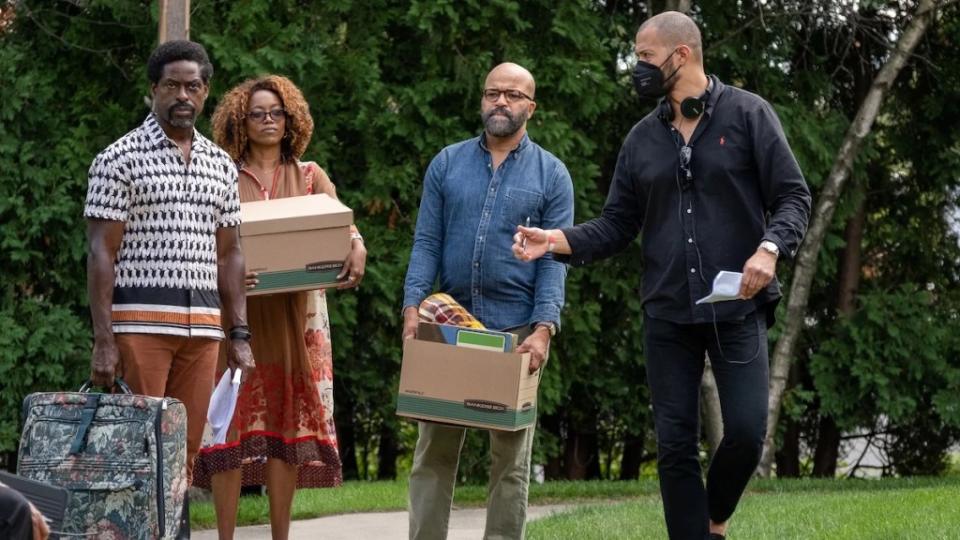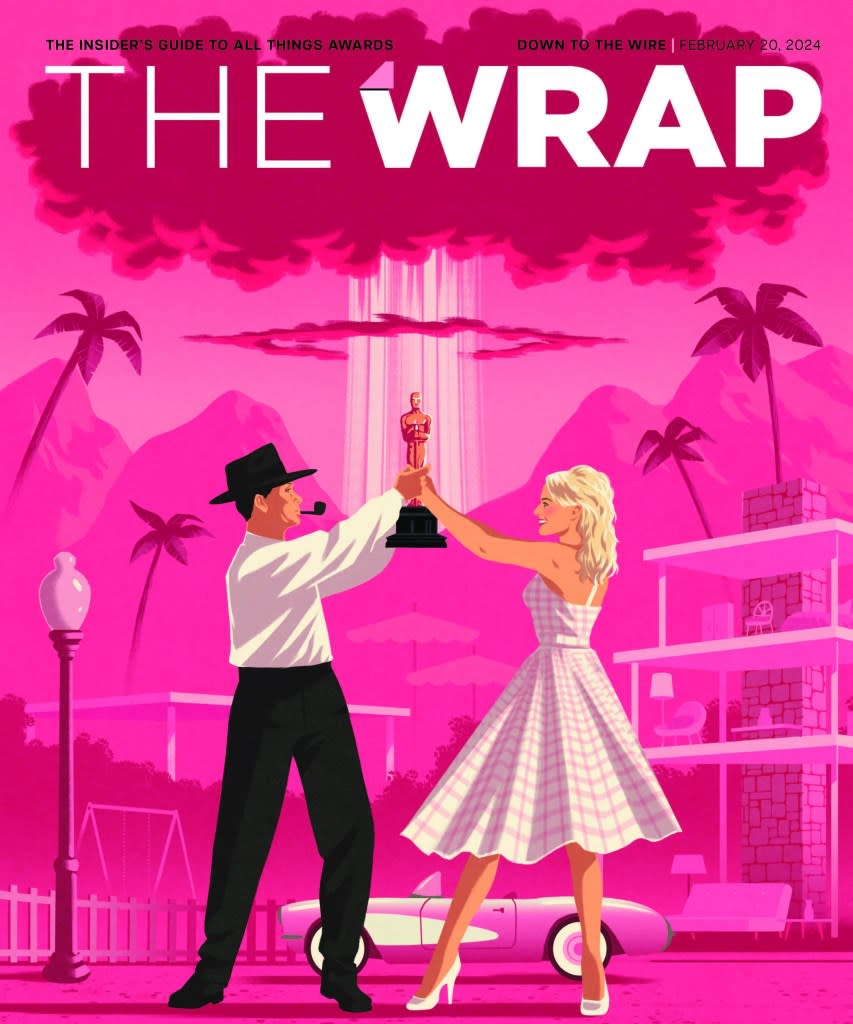How Cord Jefferson and Celine Song Grabbed Oscar Success With Their First Movies
- Oops!Something went wrong.Please try again later.
- Oops!Something went wrong.Please try again later.
- Oops!Something went wrong.Please try again later.
- Oops!Something went wrong.Please try again later.
- Oops!Something went wrong.Please try again later.
“Do you think they would put me in the Memoriam at the Oscars if I got killed?” ‘
“American Fiction” writer and director Cord Jefferson was driving in the rain in Los Angeles while doing a joint Zoom interview with “Past Lives” writer and director Celine Song when he asked that question, his phone attached to his dashboard and his eyes darting across the wet L.A. streets ahead of him.
Song immediately groaned and scolded Jefferson. “I don’t like morbid jokes like this,” she said with a grimace — and, to be fair, just a bit of a smile. “I don’t know why you’re laughing. I’m not laughing.”
Jefferson and Song may not share the same sense of humor, but they’re linked in other ways. When “American Fiction” and “Past Lives” were both nominated for the Academy Award for Best Picture this year, they joined a storied lineup of directors whose first films were nominated for the top Oscar, including Orson Welles for “Citizen Kane,” Jordan Peele for “Get Out,” Sidney Lumet for “12 Angry Men,” Todd Field for “In the Bedroom,” Mike Nichols for “Who’s Afraid of Virginia Woolf?” and Greta Gerwig for “Lady Bird,” as well as Best Picture winners Sam Mendes for “American Beauty,” Kevin Costner for “Dances With Wolves,” Rob Marshall for “Chicago” and James L. Brooks for “Terms of Endearment.”
Jefferson had begun his career as a journalist and then became a television writer, winning an Emmy for “Watchmen,” before he adapted Percival Everett’s 2001 novel “Erasure”and landed five Oscar nominations for the pointed comedy starring Jeffrey Wright as an author fed up with being pigeonholed by his race. Song, who was born in South Korea, had been a playwright before making her directorial debut with a gentle story about a woman who is reunited with her childhood sweetheart more than two decades after leaving Korea.
“American Fiction,” which won the audience award at the Toronto Film Festival, and “Past Lives,” which premiered in January 2023 at Sundance and won the Gotham Award as the year’s best indie film, are two of the best surprises of the last year in cinema. The filmmakers talked about their work with TheWrap—and for the record, Jefferson made it to his destination intact.

How are you holding up in your first awards season?
CELINE SONG For me, it being the first time is a source of great energy. I find that I have more energy and passion for it than I could have ever expected. Also, part of it that I really love is getting to hang out with other filmmakers who made great films this year. There is a part of the being in the room makes me feel like a part of a community in that way. I’ve been really surprised by my own ability to hold up, you know? What about you, Cord?
CORD JEFFERSON That’s exactly what I was gonna say. I’ve been sick probably more than I’ve ever been sick in my adult life for the past few months. I was constantly getting colds and bronchitis from all the travel and everything. But it’s all worth it. It’s the ability to sit down with other artists whose work I really love. I was just in London for a thing, and I was talking to Jonathan Glazer. I got to tell him that I’m obsessed with his movie Sexy Beast. And I get to meet Celine and talk to Celine about her work and my work. That, to me, makes it all worthwhile.
Yes, it’s a little exhausting. But I always just try to remind myself that I put out a film and people still want to talk about it several months after it’s been out. That is certainly preferable to putting out a movie and having nobody interested in it a few months after it’s been out.
As first-time directors, what came most easily to you and what was the trickiest to learn?
JEFFERSON For me, I don’t know if any part of it was easy. But I would say the thing that I didn’t realize before I started directing was that in some ways I’d already been directing when I was writing. When I was writing scenes, I was thinking, What are these people gonna be wearing in this scene? How do I want the actors to walk around this space? How do I want them to enunciate these lines? How do I want them to tell this joke? I was already thinking about how I would direct this. The difference was that when I was working on TV shows, I would just then hand off the script to somebody else and they would execute their vision, and my vision would just go away.
And I would say that the biggest challenge would be that it was never my responsibility to market the thing. I’ve worked in entertainment since 2014. For my entire career, I worked in the writer’s room. I helped the showrunner execute their vision and then I packed up my stuff and I left. And once the show was on the air, that was the showrunner and the actors and everybody else’s responsibility. And so, for me, this entire process of being out on the road and marketing a thing and helping sell it to audiences, that is all brand new. I don’t know that it’s necessarily more difficult than making the movie, but it is a brand new element to the job that I had never encountered before.
SONG To me, the thing that came really easily is the thing that I’ve done the longest, which is the story, character, dialogue, working with actors and blocking. That’s all part of my work as a playwright, so that’s the part that I could always hold onto.
And what is difficult is the uncertainty, knowing that it’s my first movie that I’m directing. I talk about it as a dragon that I’m slaying every day, which is the feeling of not knowing how we’re gonna get through the day. The list of things that I don’t know is really, really long on the first day of shooting. It’s an endless list. And then there is a list of things that I do know: story, character, dialogue, blocking, actors.
But eventually the things that I don’t know start to shrink every day. I learn how to read the call sheet. I know who to ask for what problem. Eventually, what I love most about making a movie for the first time is the way that the list of things I do know and the list of things that I don’t know start to shift.
JEFFERSON I think it’s interesting that both Celine and I come from a background of writing. I’d been thinking about directing for, like, five years before I directed this film. And everybody was like, “How did you know that this was the one that you wanted to jump into?” It’s because I knew this story and these characters on such a fundamental level, I felt like I’d finally found something that I knew in my bones, molecularly.
What gave me the courage to step onto set every day was that even if I didn’t know what was going on with the lights or the cameras that day, even if I didn’t know these technical things, I did know what story we were trying to tell. That place of real confidence in understanding the story and the characters allowed me to say, “OK, I don’t know about lights but I know that this needs to be the mood for this scene. And the lighting needs to reflect that. And what we do with the cameras needs to reflect the isolation that Monk feels here.” I was able to tap into the emotions and the story of it, and that helped guide all the technical stuff that I didn’t necessarily understand.

Both of these films are very personal in certain ways — Celine because it reflects your experience living a life far from where you grew up, Cord because of being defined as a writer by your race. Does it take a story that personal to spur you to take the leap into directing?
SONG It is a much easier way to ask people to believe in you. Because it’s so personal, connected to this actual moment in my own life that happened, it can help convince everyone that I know how to make this movie. And because it’s so personal, I can endlessly argue for the opportunity to direct it. So it makes sense that this is the first opportunity that I had to direct a movie.
JEFFERSON I think Celine’s absolutely right. Before we sent the script to anybody, I was like, “They need to know it’s a package deal.” I didn’t want somebody being like, “Yes, we love this script. Now let’s see what Spike Lee’s doing.” I needed to let people know, “No, this is gonna be me if you want this.” Because it’s so personal, I think that it makes it easier for people to say, “OK, this person understands this deeply.”
Let me ask Celine a question. The thing that finally made me courageous enough to say, “I want to direct this” was that I knew that if somebody were to come to me and say, “Great, now let’s give it to a director,” it would’ve felt like giving away a limb. And so I’m wondering, Celine, if somebody had come to you and said, “We love this script but we want to give it to a different director,” do you think you would’ve been able to do that to get the film made?
SONG Oh, I was genuinely open to that. (Laughs)
JEFFERSON You were?
SONG Yeah. I just knew that it deserved to be made, right? I didn’t know the industry. I was like, “I need this to get made in a way that the story deserves to be told. I really hope you see that I’m the director for it, but I understand if you cannot fund that.”
Has the success of these two films upped the stakes for what you do next?
SONG I don’t know. Maybe this comes from me having been in theater for so long, but I think that every project, regardless of scale or scope or the context or what’s come before, is the highest stakes possible. I don’t think the stakes have necessarily changed, because whether it’s a play that I’m doing in a basement in New York or a big movie with a big budget, it still has to pass the ultimate test. And the only test that I really believe in is the test of, “Do I love it? Am I devoted to it?” I have to be devoted to the point where it’s a bit frenzied or fanatical.
JEFFERSON For me, I am deeply, deeply insecure. All of this is wonderful and I’m loving every minute of it and I’m so proud of the film and so happy for everybody that made it with me. But there’s still going to be a deep pit of insecurity that will hit me come April, no matter what happens in March.
This industry frequently tries to force people to strike while the iron is hot, so to speak. But I need to block out all the expectations that other people have for what’s next and focus on being as methodical and patient as I was with this movie. I want to go inward a little bit and figure out what’s next in my own time.
This story first appeared in the Down to the Wire issue of TheWrap’s awards magazine. Read more from the issue here.

The post How Cord Jefferson and Celine Song Grabbed Oscar Success With Their First Movies appeared first on TheWrap.

